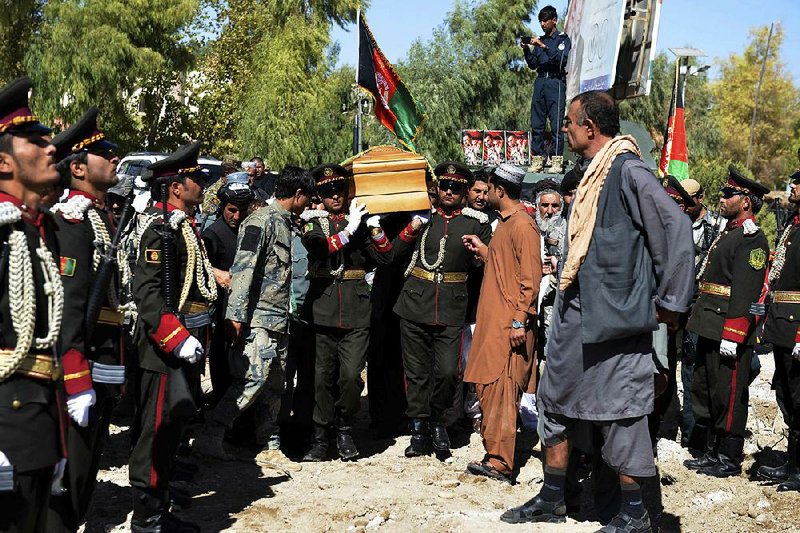KABUL, Afghanistan -- Afghanistan's election commission on Friday postponed elections in Kandahar for a week, after an a attack on a high-profile security meeting there with a U.S. delegation that killed at least two senior provincial officials, including the province's police chief.
The development came as mourners gathered for the funeral of police chief Gen. Abdul Raziq, assassinated in Thursday's attack. The Taliban have claimed responsibility for the assault, saying they targeted the top U.S. commander in the country, Gen. Austin "Scott" Miller, who was at the meeting but was unharmed.
The Independent Election Commission's deputy spokesman Aziz Ibrahimi said the postponement was meant to allow mourners to observe funeral rites for the slain officials.
Also killed in Thursday's attack was the Kandahar intelligence chief, Abdul Mohmin.
Reports about the fate of the governor of Kandahar, Zalmai Wesa, were contradictory Thursday. But on Friday, Afghan officials released a video of him recovering in a hospital bed.
The Kandahar meeting, convened to discuss security plans for today's planned parliamentary elections, had just concluded when an elite Afghan guard turned his gun on the departing delegation.
Two Afghan policemen were also killed and three were wounded in the attack, according to a Kandahar hospital official who spoke on condition of anonymity because he wasn't authorized to talk to reporters.
Three Americans -- a U.S. service member, a coalition contractor and an American civilian -- were wounded and in stable condition, NATO said.
The attack was the latest major setback for the parliamentary elections, which have already been delayed by three years. Kandahar is the second of Afghanistan's 34 provinces, along with Ghazni province, where voting will not take place today, and one-third of the polling stations in the rest of the country will not open because they are in areas either controlled or influenced by the Taliban.
The insurgents have issued repeated threats about the elections, saying they will do everything they can to stop them. In one statement, they "ordered" educators to not allow their schools to be used as polling centers, or teachers to work as election staff on voting day. In another statement Friday, they said they would block "all small and large roads" across the country on Election Day.
A Kandahar lawmaker running for parliament, Khaled Pashtun, said the one-week postponement in the polling was meant to give voters who might have stayed at home today, afraid so soon after the attack, the chance to vote in the elections.
Nevertheless, the attack, more than 17 years after the Taliban were driven from power, underscores the harrowing insecurity in Afghanistan ahead of the elections.
Taliban spokesman Qari Yousuf Ahmadi said the militant group carried out the attack and that Miller was the target.
But U.S. Army Col. David Butler, who attended the meeting with Miller, said Raziq was clearly the target, not the U.S. general. Butler said the assailant shot at Raziq and then appeared to spray the area with gunfire before he was killed.
He said Miller and the Afghan leaders had moved outside the palace after several hours of meetings and were standing in small groups in the compound. He said he heard several shots "and we all took cover. It was over in seconds."
Butler added that Miller made sure the scene was secure and the wounded were taken away by medivac before he left the area and returned to Kabul.
Miller appeared on the streets of Kabul, where he was filmed chatting with Afghan security forces. The gesture was seen as an attempt to strengthen morale after the loss of Raziq. Miller's appearance was also seen as a move to quash rumors that he had been a casualty in the attack.
"Yeah, I am fine, I am fine," the general says in one video, as Kabul's police chief, Gen. Sayed Mohammad Roshandi, shakes his hand and asks about Kandahar.
"What happened down there was an attack on the security forces. But I tell you we will still remain with the security forces," Miller told the Afghan channel Tolonews. "It was a closed, confined space, but I don't assess that I was the target."
Raziq was a close U.S. ally despite widespread allegations of corruption. He ruled Kandahar with an iron fist and had survived several past assassination attempts, including one last year that killed five diplomats from the United Arab Emirates.
Afghan President Ashraf Ghani's adviser, Ziaulhaq Amarkhil, said the attack was meant to disrupt elections and urged voters to defy Taliban threats, saying casting their ballot "would be a big slap on the face of the enemy."
Speaking while in Singapore for a conference Thursday, U.S. Defense Secretary James Mattis called Raziq's death a tragic loss but said he believes the Afghan security forces have matured to the point where they can continue fighting the Taliban without him.
Information for this article was contributed by Kathy Gannon and Amir Shah of The Associated Press; and by Taimoor Shah and Mujib Mashal of The New York Times.
A Section on 10/20/2018
